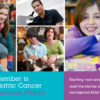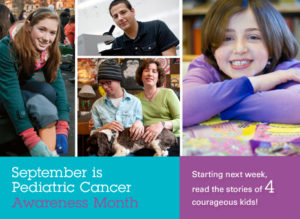Hair loss can be a jarring side effect of chemotherapy. When I was treated for breast cancer, I was nervous about my appearance and decided to wear a wig. At first it was a strange experience, but wearing a wig helped me face the day — and a TV audience. Here are five tips I learned for selecting a wig and wearing it with confidence.
Uncategorized
How to Enjoy Summer without Raising Your Cancer Risk
by Joanna Steere
As summer takes hold, it’s often hard to resist the delicious aroma of a backyard barbecue or soaking in some rays at the beach. However, it’s important to know the health risks associated with these common activities, especially when cancer’s involved.
How to Find Good Cancer Information Online
For many cancer patients, the Internet serves as a vital tool used to stay in touch with loved ones during treatment, find comfort and advice from other patients and caregivers, or even research clinical trials. But using the Web to learn more about a cancer diagnosis or potential treatments requires a healthy dose of caution. For all of its many benefits, the Internet used unwisely can lead to scams and misinformation, as well.
So what’s the best way to separate fact from fiction on the Web? We asked experts in Dana-Farber’s Eleanor and Maxwell Blum Patient and Family Resource Center, for some tips to consider when researching cancer information online.
When It Comes to Cancer, Everyone Can Help
By Jim Donovan
In 2002 my good friend died of cancer. He and I were at MIT together as undergraduates, where we shared a lot of great memories and developed a long-lasting friendship. Like most of us who walk with a loved one through a life-threatening disease, I experienced feelings of anger, sadness, and fear. I don’t have a medical background, and honestly didn’t understand some of the terminology that doctors used during the diagnosis and the treatment. This made me feel helpless. But I wanted to help. So I discovered other ways I could support my friend.
First and foremost, I tried to keep him positive and make him as comfortable as possible. I brought him the food he liked, watched movies with him, and stayed up late talking with him when he was sad and discouraged. I also tried to bring humor to his day because, as everyone knows, laughter is powerful medicine. I spent as much time with him as I could, depending on his needs and those of his family, and made sure to plan things for the future that he could look forward to. I reassured his wife that I would do anything to help her so his most important source of strength and comfort felt supported, too. And, so he would feel as informed as possible, I researched other patients in similar positions with the same cancer, and shared what I learned about their experiences.
Five Things to Say to a Cancer Patient: Talking With Someone Who Has Cancer
By Michael Buller Whenever I’ve met people with cancer, I’ve been at a loss for what to say and which questions to ask. Now, as a cancer patient, I realize the irony. Looking back, whatever I said ranged from ignorant to unhelpful. Or, I would just say nothing. I would talk about anything and everything else, … Read more
Mental Fog, Chemotherapy Side Effect, Is Real and Often Treatable
Not long ago, doctors were often skeptical when cancer patients who had undergone chemotherapy complained that they were mentally foggy; unable to plan a week’s worth of meals or organize their finances as they could before. Patients called this side effect “chemobrain” and were frustrated by the lack of recognition – or suggested remedies – from their physicians.
If You Build It, They Will Come: Cancer Care in Rwanda
by Barbara Virchick
On July 18, 2012, a Cancer Center of Excellence opened in Butaro, Rwanda, as a collaboration between Partners In Health and Dana-Farber/Brigham and Women’s Cancer Center. I was fortunate to have been there during this exciting time, working as part of a three-month fellowship to help train the nursing staff to care for Rwandan cancer patients.
I don’t think any of us were prepared for the explosion of patients who would arrive during the first month we were open.
Why Do Scientists Use Zebrafish to Study Cancer?
Cancer scientists use a wide variety of techniques to study the growth and development of tumor cells. Laboratory research often focuses on individual cells or tissue samples, but to learn how cancers grow and respond to therapies in living organisms, scientists rely on other experimental models. In recent years, zebrafish have become the model of choice for studying many cancer types. Dana-Farber’s A. Thomas Look, MD, who uses zebrafish in his own work, explains why.
The HIV Spike, Revealed
The gaudy green image you see below is not an avant-garde sculpture, but the most detailed image yet made of the protein “spike” that allows HIV – the virus that causes AIDS – to latch onto and enter human blood cells.
Fun with Pink
It was glitter and glue when patients, visitors, and Dana-Farber staff gathered on Oct. 4 to create art on an unusual canvas – bras. Hosted by Friends’ Place and Dana-Farber’s Creative Arts Program, the “Decorate a Brassiere” art therapy event allowed attendees to creatively honor Breast Cancer Awareness Month.
The Faces of Pediatric Cancer – Sarah Levin
Faces of Childhood Cancer: Sarah Levin
Sarah Levin is 11 years old, and has beaten acute lymphoblastic leukemia (ALL) twice. This is her story.
The first time I got diagnosed with ALL I was only three, so I don’t remember that much about it. But what my mom and dad have told me is that it was a really sad and scary time for my family.
The Faces of Pediatric Cancer – Fernando Morales
Fernando Morales is a student athlete. Last year he was sidelined from the life he knew after he was diagnosed with Ewing sarcoma. Now done with treatment Fernando is back with his teammates, sporting a positive outlook and a new appreciation for life. This is his story.
 As a soccer player and member of the track and field team at my high school, running is a big part of my life. But one morning I started getting shooting pains in my knee. All of a sudden walking and running became very difficult. In the blink of an eye I lost a big part of my identity, which hurt almost as much as my leg. Almost.
As a soccer player and member of the track and field team at my high school, running is a big part of my life. But one morning I started getting shooting pains in my knee. All of a sudden walking and running became very difficult. In the blink of an eye I lost a big part of my identity, which hurt almost as much as my leg. Almost.
The Faces of Pediatric Cancer – Caitlynne McGaff
Caitlynne McGaff is an active 17-year-old. She owes a lot of her mobility to an innovative surgery she had at Dana-Farber/Boston Children’s Cancer and Blood Disorders Center to treat her osteosarcoma. This is her story.
When most people my age talk about a day they’ll never forget, they mention getting their license, or a great sweet sixteen party. For me, it’s a little different.
A Closer Look at Childhood Cancer
September is National Childhood Cancer Awareness Month. Beginning next Wednesday, and over the next four weeks, we’ll introduce four children – Caitlynne, Fernando, Sarah and Steven – who while still young, have already overcome one of the biggest challenges of their lives.
These four represent just a few of the many faces of childhood cancer across the United States and the world. We hope you’ll join us in September in honoring all of the children who come to Dana-Farber/Children’s Hospital Cancer Center, as well as their caregivers—doctors, nurses, psychologists, social workers, researchers, administrators and more—who work tirelessly until every child is well.
 We begin with a conversation with Lisa Diller, MD, chief medical officer and clinical director of Pediatric Oncology at Dana-Farber/Children’s Hospital Cancer Center.
We begin with a conversation with Lisa Diller, MD, chief medical officer and clinical director of Pediatric Oncology at Dana-Farber/Children’s Hospital Cancer Center.
Black Hawk Pilot Ben Groen battles lymphoma diagnosis
New Year’s Eve 2010. In a military hospital in Hawaii with much of the staff away for the holidays, Army pilot Ben Groen learned he’d been diagnosed with T cell lymphoblastic non-Hodgkin lymphoma, a rare, aggressive cancer of the white blood cells and lymph nodes. His doctor told him that his treatment – which would need to begin almost immediately and require months of hospitalization – would exceed the capacity of the base’s blood bank.
Can aspirin prevent or treat cancer?
Aspirin has been around for over 100 years. In the last 50 years, research has shown that regular use of aspirin may prevent heart disease. Now a new study points to aspirin’s effectiveness in preventing and treating cancer.
A recent University of Oxford investigation pooled more than 50 studies to show that regular aspirin use could reduce your chances of developing certain types of cancer, and may be effective in treating some cancers as well. We talked to Charles S. Fuchs, MD, MPH, director of the Gastrointestinal Cancer Center at Dana-Farber for his take on the recent research.
How to protect children from the sun
Applying sunscreen to wiggly young children can be a challenge, but sun protection is especially critical for young skin. Babies and young children are especially sensitive to the sun. There are several lines of evidence indicating that burns during youth significantly contribute to melanoma risk. For instance, just one blistering sunburn in childhood more than doubles an individual’s risk of developing melanoma later in life.
- In a three-year study of fifth graders, the percentage of children who “often or always” used sunscreen declined from 50 to 25 percent.
How are Genes Involved in Cancer?
Genes don’t cause cancer, but genetic mutations can. Our cells have about 22,000 genes, which consist of DNA packed into chromosomes inside the cell nucleus. These genes control a wide range of functions, including cell growth and division. When the genes misbehave or mutate, cancer can develop. Sometimes these mutations are inherited. In that case, … Read more
AT/RT: How my son faced a rare cancer and beat the odds
Medically reviewed by Mark W. Kieran, MD, PhD, Anupama Narla, MD, and Susan N. Chi, MD Most parents treasure the big moments in a child’s life: first steps, first word, first day of school. I, on the other hand, treasure every moment with my son, Declan – the simple act of eating breakfast together, watching … Read more
World Cancer Day: Tips for prevention
As we recognize World Cancer Day today, it’s important to remember that one-third of cancer deaths worldwide are tied to lifestyle and diet, making them largely preventable. Dr. Judy Garber, director of Dana-Farber’s Center for Cancer Genetics and Prevention, provides some perspective, and highlights some of the steps individuals can take to reduce their cancer … Read more
